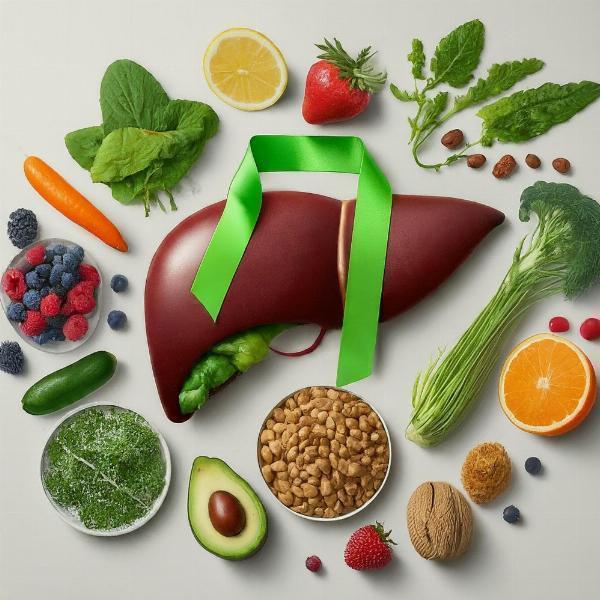The Ultimate Guide to Liver Health: Protecting and Enhancing Your Vital Organ

Strong 8k brings an ultra-HD IPTV experience to your living room and your pocket.
The liver is one of the most crucial organs in our body, playing a central role in various essential functions, including detoxification, metabolism, and digestion. Despite its vital importance, many people overlook the need to maintain liver health until problems arise. This guide will delve into the significance of liver health, common liver disorders, and practical tips for keeping your liver in optimal condition.
Understanding the Liver’s Functions
The liver is a powerhouse of activity, performing over 500 vital functions. Here are some of its primary roles:
1. Detoxification
One of the liver's most critical functions is detoxifying harmful substances from the bloodstream. It processes and eliminates toxins, such as drugs, alcohol, and metabolic waste products, ensuring they are safely excreted from the body.
2. Metabolism
The liver is central to metabolism, including the conversion of nutrients from food into energy. It helps regulate blood sugar levels by storing and releasing glucose as needed. Additionally, the liver plays a role in fat metabolism, breaking down fats for energy and producing cholesterol.
3. Digestive Support
The liver produces bile, a substance essential for digesting fats and absorbing fat-soluble vitamins (A, D, E, and K). Bile is stored in the gallbladder and released into the small intestine during digestion.
4. Synthesis of Proteins
The liver synthesizes various essential proteins, including albumin, which helps maintain blood volume and pressure, and clotting factors that are crucial for blood coagulation.
5. Immune Function
The liver plays a role in immune function by filtering pathogens from the blood and producing immune cells that help fight infections.
Common Liver Disorders
Several conditions can affect liver health, ranging from mild to severe. Understanding these conditions can help you take preventive measures and seek appropriate treatment:
1. Fatty Liver Disease
Fatty liver disease occurs when excess fat accumulates in liver cells. It can be caused by obesity, diabetes, or excessive alcohol consumption. There are two main types: Non-Alcoholic Fatty Liver Disease (NAFLD) and Alcoholic Fatty Liver Disease (AFLD). Both can lead to inflammation and liver damage if left untreated.
2. Hepatitis
Hepatitis is an inflammation of the liver, commonly caused by viral infections (Hepatitis A, B, C, D, and E). Chronic hepatitis can lead to serious liver damage, including cirrhosis and liver cancer. Vaccines and antiviral medications can help manage and prevent hepatitis.
3. Cirrhosis
Cirrhosis is the scarring of the liver tissue due to long-term damage. It can result from chronic alcohol abuse, viral hepatitis, or other conditions. Cirrhosis impairs liver function and can lead to liver failure. Early detection and treatment are crucial to manage symptoms and prevent progression.
4. Liver Cancer
Liver cancer often develops as a result of chronic liver conditions such as cirrhosis or hepatitis. It can be primary (originating in the liver) or secondary (spread from other organs). Regular screenings and lifestyle modifications can reduce the risk of liver cancer.
Tips for Maintaining Liver Health
Maintaining liver health involves adopting a healthy lifestyle and making mindful choices. Here are some effective strategies:
1. Adopt a Balanced Diet
A nutritious diet supports liver function and overall health. Focus on consuming a variety of fruits, vegetables, whole grains, lean proteins, and healthy fats. Foods rich in antioxidants, such as berries and leafy greens, help protect the liver from oxidative stress. Additionally, incorporating foods high in fiber, such as oats and beans, supports digestion and detoxification.
2. Limit Alcohol Intake
Excessive alcohol consumption is a leading cause of liver disease. Limiting alcohol intake or abstaining altogether can prevent liver damage and support overall liver health. The recommended guidelines suggest no more than one drink per day for women and two drinks per day for men.
3. Maintain a Healthy Weight
Obesity and overweight are risk factors for fatty liver disease and other liver conditions. Engaging in regular physical activity and maintaining a healthy weight through a balanced diet can reduce the risk of liver disease and improve liver function.
4. Stay Hydrated
Adequate hydration is essential for liver health. Drinking plenty of water helps flush out toxins and supports optimal liver function. Aim for at least eight glasses of water daily, and adjust your intake based on activity level and climate.
5. Get Regular Check-Ups
Regular medical check-ups can help monitor liver health and detect any potential issues early. If you have risk factors for liver disease or experience symptoms such as jaundice, abdominal pain, or unusual fatigue, seek medical attention promptly.
Maintaining liver health is essential for overall well-being and vitality. By understanding the liver's vital functions, recognizing common liver disorders, and adopting healthy lifestyle practices, you can support and enhance your liver's health. Incorporating a balanced diet, staying hydrated, limiting alcohol, and getting regular check-ups are key steps in protecting this vital organ. Remember, a healthy liver contributes to a healthier you.
Note: IndiBlogHub features both user-submitted and editorial content. We do not verify third-party contributions. Read our Disclaimer and Privacy Policyfor details.


